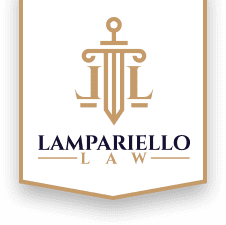Personal Injury Lawyers & Car Accident Attorneys Serving Florida
At Lampariello Law, our philosophy is one of service – making sure we provide our clients with the best possible legal representation to protect their rights and interests. Our extensive experience in handling persons injured, dealing with insurers, and navigating the courts means that LLG is able to bring a unique level of quality to your case.
Our team at LLG comes with an extensive wealth of experience. This experience isn’t limited to representing injured individuals; it spans across dealing intricately with insurance companies, adeptly navigating the complexities of court systems, and understanding the intricate nuances of various legal scenarios. The cumulative years of practice and the diverse range of cases we’ve handled means that LLG can offer unparalleled quality and depth to your legal proceedings.
We pride ourselves on being direct and effective. From personal injury cases to car accident claims, elder law and trust, estate and real estate cases, we are experienced litigators ready to fight for your case. Each of these areas comes with its unique challenges, and at LLG, our attorneys are not just ready, but eager, to rise to the occasion and fight tenaciously for your case.
We specialize in fast, effective solutions to legal problems – and we bring that specialization to the front of our law firm. If you have been in an accident, don’t hesitate to contact LLG today for a free consultation.
Based in Florida and operating in Davie, Weston, Royal Palm Beach and Delray Beach, our personal injury lawyers and car accident attorneys offer swift and effective solutions. This focus on efficiency and results is what brings our specialization right to the forefront of our practice. In unfortunate instances where you might find yourself involved in an accident or any other legal quandary, remember that LLG is just a call away. Don’t hesitate to reach out to us today for a no-obligation, free consultation. Your peace of mind and justice are our paramount concerns.



Types of Cases Our Injury & Car Accident Lawyers Handle
Contact Lampariello Law For A Consultation
Complete the contact form to schedule a case review.
*Please do not send any highly sensitive or confidential information using this form. Submitting this form does not create an attorney-client relationship.
Our Personal Injury Attorney Headquarters
Proudly serving all of Florida. Although we are headquartered in Royal Palm Beach, Davie, and Weston. our attorneys represent clients across the state.
Royal Palm Beach Personal Injury Lawyer
Car Accident Attorneys & Personal Injury Lawyers Serving Davie, Royal Palm Beach ,Weston & Delray Beach
LLG works for you, and we’re always available when you need us. With client-focused services, we strive to always keep you updated with your case, and how we plan to move it forward. Whether you’ve been injured on the road, at work, or due to someone else’s negligence, you deserve justice and compensation. We’re committed to advocating for the rights of Florida’s residents and ensuring they get the representation they deserve.
We don’t just represent you; we collaborate with you. We understand the stress and anxiety that legal procedures can entail, which is why we make it our mission to keep you well-informed at every stage. Regular updates on your case, detailed explanations of our strategies, and a transparent roadmap of how we intend to advocate for you are all integral parts of our commitment.
Accidents and injuries can be a life-altering experience, especially when they are a result of someone else’s negligence. From auto accidents and workplace injuries to wrongful death, social security disability, and more, our personal injury attorneys have you covered. You have rights, and LLG is dedicated to ensuring you’re compensated justly for your suffering. Every resident of Florida should have access to top-notch representation, and we are unwavering in our mission to deliver on that promise.
Our approach is not just about legal representation; it’s about empowerment. We aim to provide you with an accurate estimate of the potential value of your accident claim. This knowledge equips you to make informed decisions about your future. Moreover, our contingency fee basis is a testament to our confidence in our abilities and our commitment to you. If we don’t win, you don’t pay. It’s our way of ensuring that our objectives are aligned with yours – to seek justice and claim what you rightfully deserve.
Royal Palm Beach Personal Injury Attorney
Royal Palm Beach Car Accident Attorney
Royal Palm Beach Slip and Fall Attorney
Delray Beach Car Accident Attorney
What Our Clients Say
Frequently Asked Questions

No Fees Unless You Win
Royal Palm Beach Personal Injury Lawyers
-
954-343-8712
-
Open 24 hours
Davie Personal Injury Lawyers
-
954-343-8712
-
Open 24 hours
Weston Personal Injury Lawyers
-
954-787-9143
-
Open 24 hours
Delray Beach Personal Injury Lawyers
-
954-787-9143
-
Open 24 hours
Atlanta, GA Personal Injury Lawyers
-
954-787-9143
-
Open 24 hours
















